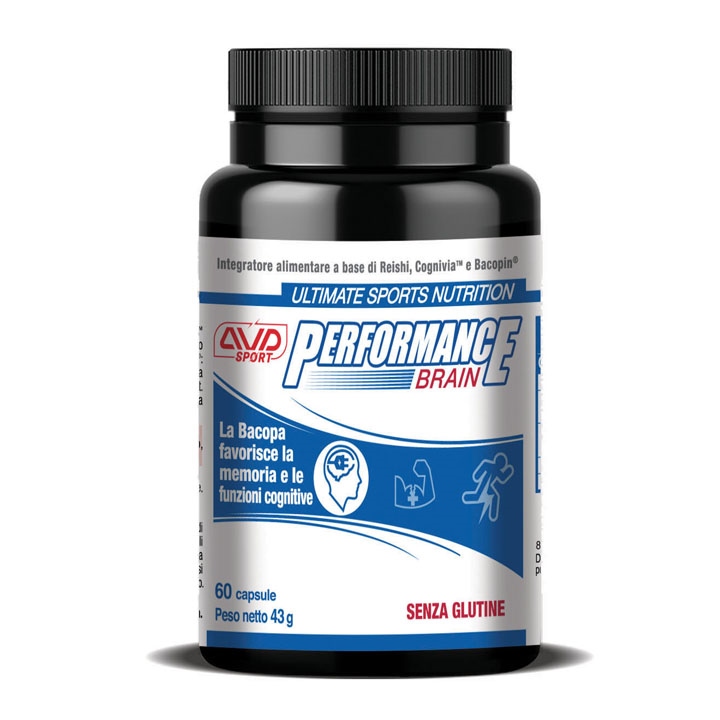
Helps to improve memory and concentration and optimises cognitive performance
HEALTH BENEFITS:
Food supplement containing Reishi, Cognivia™ and Bacopin® helps to improve memory and concentration, optimises cognitive performance and reduces the perception of stress during performance.
Performance Brain is a ‘nootropic’ synergy of ingredients created to optimise the cognitive functions and physical and mental performance of people under physical and mental stress who need to improve their attention, concentration and focus in order to achieve optimal performance, with particular reference to elite and master athletes.
PROPERTIES OF THE INGREDIENTS:
- Organically-grown Reishi (Ganoderma lucidum): one of the mushrooms most commonly used by sports people, it boosts energy levels, improves cellular respiration, protects the mitochondrial function from oxidative stress, reduces chronic low-grade inflammation, fights mental and physical fatigue and improves memory and focus. Thanks to its high triterpene content, it modulates the stress axis, supports the adrenal glands and the hypothalamic-pituitary-adrenal axis, reduces the feeling of fatigue and regulates sleep rhythms
- Cognivia™: it combines the properties of two species of sage, Salvia officinalis, which improves cognitive performance by increasing the focus on achieving goals, and the essential oils of Salvia lavandulifolia, which enhances memory processes. Studies show improvements in cognitive function and in long-term memory and executive processes, even after one single dose.
- Bacopin®: (standardised extract of Bacopa monnieri titrated at 20% in Bacosides): helps boost memory, concentration and cognitive functions. On the physical level, Bacopa helps improve sports performance, alleviates muscle fatigue and increases muscle glycogen reserves. On a cognitive level, it helps to improve reaction speed, focus and spatial and working memory, thus increasing quickness of reflexes.
- Newcaff® (Microencapsulated caffeine): caffeine is an ergogenic substance and microencapsulation improves its bioavailability by providing controlled and sustained release over 4 hours. Its effectiveness has been demonstrated in both athletes under prolonged exertion, with intermittent sprints, and in endurance athletes, as well as in power and strength sports, without producing any change in the insulin and blood glucose levels.
HOW TO USE:
It is recommended to take 1 capsule a day as a maintenance dose, then to increase the dose to 2 capsules a day starting two days before the competition, and to 4 capsules on the day of the competition
PACK:
60 capsules
vegetable cellulose capsules
NOTES:
Gluten Free
Play Sure-Doping Free certified product
| AVERAGE INGREDIENT CONTENT | PER DAILY DOSE (3 CAPSULES) |
| Ganoderma lucidum (Reishi) | 565 mg |
| Cognivia® (Salvia officinalis e Salvia lavandulifolia) | 500 mg |
| Bacopin® (Bacopa monnieri) titrated at 20% | 372 mg |
| Bacoside content | 75 mg |
| Caffeine | 75 mg |
BIBLIOGRAPHY:
- Nathan, PJ., et al. “The neuropharmacology of L-theanine (N-ethyl-L-glutamine) a possible neuroprotective and cognitive enhancing agent.” Journal of Herbal Pharmacotherapy6.2 (2006): 21-30
- Juneja, LR, et al. “L-theanine—a unique amino acid of green tea and its relaxation effect in humans.” Trends in Food Science & Technology 10.6-7 (1999): 199-204
- Yoto, A, et al. “Effects of L-theanine or caffeine intake on changes in blood pressure under physical and psychological stresses.” Journal of physiological anthropology 31.1 (2012): 28
- Kelly, SP., et al. “L-theanine and caffeine in combination affect human cognition as evidenced by oscillatory alpha-band activity and attention task performance.” The Journal of nutrition138.8 (2008): 1572S-1577S
- Park, Sang-Ki, et al. “A combination of green tea extract and l-theanine improves memory and attention in subjects with mild cognitive impairment: a double-blind placebo-controlled study.” Journal of medicinal food 14.4 (2011): 334-343
- Potgieter, S et al. “Caffeine improves triathlon performance: a field study in males and females.” International journal of sport nutrition and exercise metabolism 28.3 (2018): 228-237
- Schneiker, KT, et al. “Effects of caffeine on prolonged intermittent-sprint ability in team-sport athletes.” Medicine and science in sports and exercise 38.3 (2006): 578-585
- Stuart, GR., et al. “Multiple effects of caffeine on simulated high-intensity team-sport performance.” Medicine and science in sports and exercise 37.11 (2005): 1998
- Evans, Mark, et al. “Acute Ingestion of Caffeinated Chewing Gum Improves Repeated Sprint Performance of Team Sport Athletes With Low Habitual Caffeine Consumption.” International journal of sport nutrition and exercise metabolism 28.3 (2018): 221-227
- López-González, LM., et al. “Acute caffeine supplementation in combat sports: a systematic review.” Journal of the international society of sports nutrition 15.1 (2018): 60
- Brooks, JH., et al. “Caffeine supplementation as an ergogenic aid for muscular strength and endurance: a recommendation for coaches and athletes.” (2016)
- Nehlig, Astrid. “Is caffeine a cognitive enhancer?.” Journal of Alzheimer’s Disease 20.s1 (2010): S85-S94
- Panza, F, et al. “Coffee, tea, and caffeine consumption and prevention of late-life cognitive decline and dementia: a systematic review.” The journal of nutrition, health & aging 19.3 (2015): 313-328
- Tildesley N.T.J. et al. Positive modulation of mood and cognitive performance following administration of acute doses of Salvia lavandulaefolia essential oil to healthy young volunteers. Physiology & Behavior 83 (2005) 699-709
- Kennedy D.O. et al. Effects of Cholinesterase Inhibiting Sage (Salvia officinalis) on Mood, Anxiety, and Performance on a psychological Stressor Battery. Neuropsychopharmacology (2006) 31, 845-852
- Scholey A.B. et al. An extract of Salvia (Sage) with anticholinesterase properties improves memory and attention in healthy older volunteers. Psychopharmacology (2008) 198:127-139
- Tildesley N.T.J. et al. Salvia lavandulaefolia (Spanish Sage) enhances memory in healthy young volunteers. Pharmacology, Biochemistry and Behavior (2003) 75: 669-674
- Kennedy D.O. et al. Monoterpenoid extract of Sage (Salvia lavandulaefolia) with cholinesterase inhibiting properties improves cognitive performance and mood in healthy adults. Journal of Psychopharmacology. (2011) 25(08): 1088-1100
- Pase, MP., et al. “The cognitive-enhancing effects of Bacopa monnieri: a systematic review of randomized, controlled human clinical trials.” The Journal of Alternative and Complementary Medicine 18.7 (2012): 647- 652
- Roodenrys, S, et al. “Chronic effects of Brahmi (Bacopa monnieri) on human memory.” Neuropsychopharmacology 27.2 (2002): 279
- Calabrese, C, et al. “Effects of a standardized Bacopa monnieri extract on cognitive performance, anxiety, and depression in the elderly: a randomized, double-blind, placebo-controlled trial.” The journal of alternative and complementary medicine 14.6 (2008): 707-713
- Chaudhari, KS., et al. “Neurocognitive effect of nootropic drug Brahmi (Bacopa monnieri) in Alzheimer’s disease.” Annals of neurosciences 24.2 (2017): 111-122
- Simpson, T et al. “Bacopa monnieri as an antioxidant therapy to reduce oxidative stress in the aging brain.” Evidence-Based Complementary and Alternative Medicine 2015 (2015)
- Nemetchek, MD., et al. “The Ayurvedic plant Bacopa monnieri inhibits inflammatory pathways in the brain.” Journal of ethnopharmacology 197 (2017): 92-100
- Shinomol, GK et al. “Bacopa monnieri extract offsets rotenone-induced cytotoxicity in dopaminergic cells and oxidative impairments in mice brain.” Cellular and molecular neurobiology 32.3 (2012): 455-465
- Swathi, G, et al. “Alterations of cholinergic neurotransmission in rotenone induced Parkinson’s disease: protective role of Bacopa monnieri.” Int J Pharm Biol Sci 3 (2013): 286-292
- Hosamani, R. “Prophylactic treatment with Bacopa monnieri leaf powder mitigates paraquat-induced oxidative perturbations and lethality in Drosophila melanogaster.” (2010)
- Krishna, G., et al. “Bacopa monnieri Supplements Offset Paraquat-Induced Behavioral Phenotype and Brain Oxidative Pathways In Mice.” Central nervous system agents in medicinal chemistry (2019)
- Chen, Zhidan, et al. “Pharmaceutical composition and drug effect of synthetic Bacopa monnieri L. health promoting agent from the perspective of resistance fatigue.” Pakistan journal of pharmaceutical sciences 30 (2017)
- Kennedy, David O. “Phytochemicals for improving aspects of cognitive function and psychological state potentially relevant to sports performance.” Sports Medicine (2018): 1-20
- Peth-Nui T, et al. Effects of 12-week Bacopa monnieri consumption on attention, cognitive processing, working memory, and functions of both cholinergic and monoaminergic systems in healthy elderly volunteers. Evid Based Complement Alternat Med. 2012;2012:606424
- Tang, W, et al. “A randomized, double-blind and placebo-controlled study of a Ganoderma lucidum polysaccharide extract in neurasthenia.” Journal of medicinal food 8.1 (2005): 53-58
- Zhang, XQ, et al. “Triterpenoids with neurotrophic activity from Ganoderma lucidum.” Natural product research 25.17 (2011): 1607-1613
- Zhang, R, et al. “Ganoderma lucidum protects dopaminergic neuron degeneration through inhibition of microglial activation.” Evidence-Based Complementary and Alternative Medicine 2011 (2011)
- Cui, XY, et al. “Extract of Ganoderma lucidum prolongs sleep time in rats.” Journal of ethnopharmacology 139.3 (2012): 796-800
- Cai, Q, et al. “Polysaccharides from Ganoderma lucidum attenuate microglia-mediated neuroinflammation and modulate microglial phagocytosis and behavioural response.” Journal of neuroinflammation 14.1 (2017): 63
- Jin, M, et al. “Effects of polysaccharide from mycelia of Ganoderma lucidum on intestinal barrier functions of rats.” International journal of biological macromolecules 94 (2017): 1-9
- Chang, CJ, et al. “Ganoderma lucidum reduces obesity in mice by modulating the composition of the gut microbiota.” Nature communications 6 (2015): 7489
- Kaur, R et al. “Anti-amnesic effects of Ganoderma species: a possible cholinergic and antioxidant mechanism.” Biomedicine & Pharmacotherapy 92 (2017): 1055-1061
- Khatian, N, et al. “Effect of Ganoderma lucidum on memory and learning in mice.” Clinical Phytoscience5.1 (2019): 4
- Zhang, Y, et al. “Influence of Ganoderma lucidum triterpenoids on learning memory function and ACh content in Alzheimer disease model rat.” Chin J Exp Tradit Med Formulae 16.16 (2012): 172-175
- Huang, S, et al. “Polysaccharides from Ganoderma lucidum promote cognitive function and neural progenitor proliferation in mouse model of Alzheimer’s disease.” Stem cell reports 8.1 (2017): 84-94



